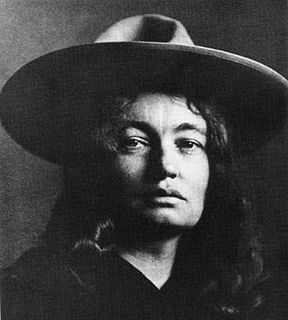A Quote by Ralph Waldo Emerson
If speculation tends thus to a terrific unity, in which all things are absorbed, action tends directly back to diversity. The first is the course or gravitation of mind; the second is the power of nature. Nature is manifold. The unity absorbs, and melts or reduces. Nature opens and creates. These two principles reappear and interpenetrate all things, all thought; the one, the many.
Related Quotes
After decades of faithful study, ecologists have begun to fathom hidden likenesses among many interwoven systems. ...a canon of nature's laws, strategies, and principles...
Nature runs on sunlight.
Nature uses only the energy it needs.
Nature fits form to function.
Nature recycles everything.
Nature rewards cooperation.
Nature banks on diversity.
Nature demands local expertise.
Nature curbs excesses from within.
Nature taps the power of limits.
When I speak of knowledge of nature, I do not mean industrial science, which argues that nature is inert and can be understood only to enable humans to manipulate it. I mean that sense of nature that Aldo Leopold had in mind when he said, "A thing is right when it tends to preserve the integrity, stability, and beauty of the biotic community, wrong when it tends otherwise.
Of the first philosophers, then, most thought the principles which were of the nature of matter were the only principles of all things. That of which all things that are consist, the first from which they come to be, the last into which they are resolved....this they say is the element and this is the principle of things.... yet they do not all agree as to the number and the nature of these principle is water.
Just do two things: meditate, watch your thought processes; become just a spectator of your mind. That is meditation, becoming a witness. And second: follow the law, follow the natural course. Don't be unnatural, don't try to fight with nature - stop being a fighter. Learn how to relax with nature, learn to let go. Flow with nature, allow nature to possess you totally.
There is in nature a parallel unity which corresponds to the unity in the mind and makes it available. This methodizing mind meets no resistance in its attempts. The scattered blocks, with which it strives to form a symmetrical structure, fit. This design following after finds with joy that like design went before. Not only man puts things in a row, but things belong in a row.
As one who knows many things, the humanist loves the world precisely because of its manifold nature and the opposing forces in itdo not frighten him. Nothing is further from him than the desire to resolve such conflictsand this is precisely the mark of the humanist spirit: not to evaluate contrasts as hostility but to seek human unity, that superior unity, for all that appears irreconcilable.
Nothing comes to pass in nature, which can be set down to a flaw therein; for nature is always the same, and everywhere one and the same in her efficacy and power of action: that is, nature's laws and ordinances, whereby all things come to pass and change from one form to another, are everywhere and always the same; so that there should be one and the same method of understanding the nature of all things whatsoever, namely, through nature's universal laws and rules.
Nature is a good teacher; he who can read the nature well, he can learn sagacious things belong to life from it. Once you stepped in the nature, your philosophical education starts. A black vulture teaches you many things; a bear teaches you many things; a bird making its nest and a rosehip which resists being frozen, they teach you many things!







































